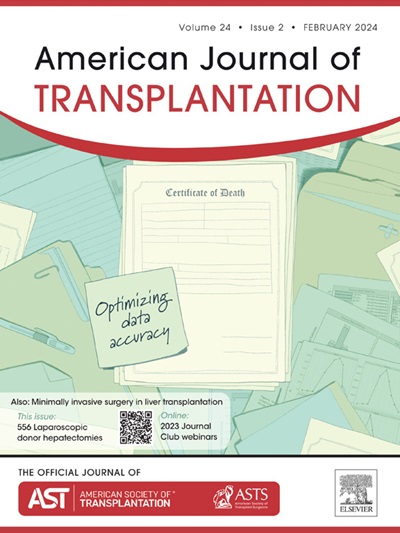HIV阳性和HIV阴性双器官心脏移植受者的短期生存率比较:呼吁增加HIV感染者获得器官捐赠的机会。
IF 8.2
2区 医学
Q1 SURGERY
引用次数: 0
摘要
艾滋病毒阳性个体获得器官移植的机会正在扩大,但需要多器官移植的艾滋病毒阳性患者的结果尚不明确。在器官共享联合网络(UNOS)登记的艾滋病毒阳性并在2010年至2023年期间接受了HT治疗的成年人纳入其中。主要终点是患者生存。在研究期间,175名hiv阳性患者接受了移植。26例(14.8%)在23个中心接受了双器官移植(20例心/肾,4例心/肺,2例心/肝)。HT时的中位年龄为56岁(IQR 47-60),大多数为男性(n=18, 69%), 46%为黑人(n= 12)。扩张型心肌病是心力衰竭最常见的病因(n= 13.50%)。所有患者都接受了来自艾滋病毒阴性供体的器官。单器官受体存活至少一年的概率为87.6% (95% CI 81.0- 92.0),双器官受体存活至少一年的概率为82.9% (95% CI 60.0-93.4)。双器官受者中hiv阳性和hiv阴性匹配对照组的总生存率无差异(log-rank p值= 0.8)。在过去的十年中,只有少数hiv阳性的终末期心力衰竭患者接受了双器官移植,短期效果令人鼓舞。本文章由计算机程序翻译,如有差异,请以英文原文为准。
Comparable short-term survival in dual organ heart transplant recipients with and without HIV: A call for increased access to organ donation for people living with HIV
Access to organ transplantation for individuals with HIV is expanding, yet the outcomes of patients with HIV requiring multiorgan transplants are not well-defined. Adult individuals with HIV in the United Network for Organ Sharing registry and who received heart transplantation between 2010 and 2023 were included. The primary outcome was patient survival. During the study period, 175 patients with HIV were transplanted. Twenty-six (14.8%) underwent dual organ transplantation (20 heart/kidney, 4 heart/lung, and 2 heart/liver) at 23 centers. Median age at the time of heart transplantation was 56 years (interquartile range 47-60); the majority were male (n = 18, 69%), and 46% identified as Black (n = 12). Dilated cardiomyopathy was the most common etiology of heart failure (n = 13, 50%). All patients received organs from donors without HIV. The probability of surviving at least 1 year was 87.6% (95% CI, 81.0%-92.0%) for single-organ recipients and 82.9% for dual organ recipients (95% CI, 60.0%-93.4%). There was no difference in overall survival between matched controls with HIV and matched controls without HIV among dual organ recipients (log-rank P value = .8). Over the last decade, only a small number of individuals with HIV with end-stage heart failure have undergone dual organ transplantation with encouraging short-term outcomes.
求助全文
通过发布文献求助,成功后即可免费获取论文全文。
去求助
来源期刊
CiteScore
18.70
自引率
4.50%
发文量
346
审稿时长
26 days
期刊介绍:
The American Journal of Transplantation is a leading journal in the field of transplantation. It serves as a forum for debate and reassessment, an agent of change, and a major platform for promoting understanding, improving results, and advancing science. Published monthly, it provides an essential resource for researchers and clinicians worldwide.
The journal publishes original articles, case reports, invited reviews, letters to the editor, critical reviews, news features, consensus documents, and guidelines over 12 issues a year. It covers all major subject areas in transplantation, including thoracic (heart, lung), abdominal (kidney, liver, pancreas, islets), tissue and stem cell transplantation, organ and tissue donation and preservation, tissue injury, repair, inflammation, and aging, histocompatibility, drugs and pharmacology, graft survival, and prevention of graft dysfunction and failure. It also explores ethical and social issues in the field.

 求助内容:
求助内容: 应助结果提醒方式:
应助结果提醒方式:


